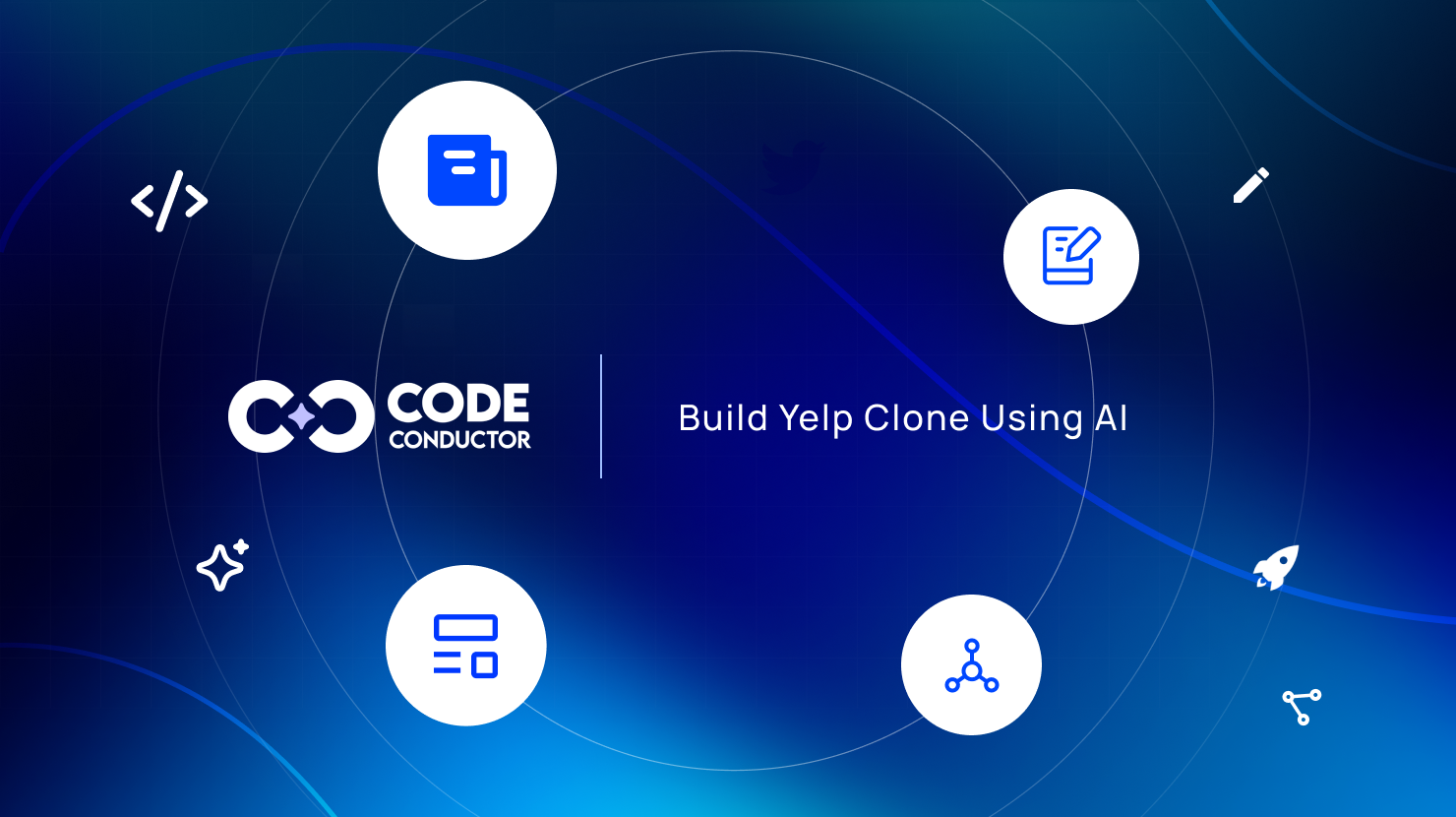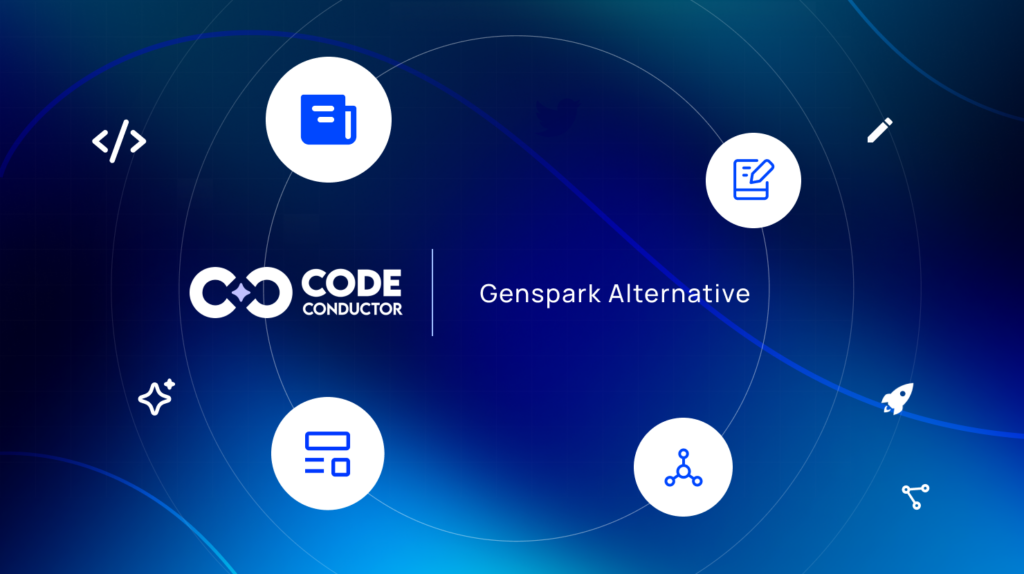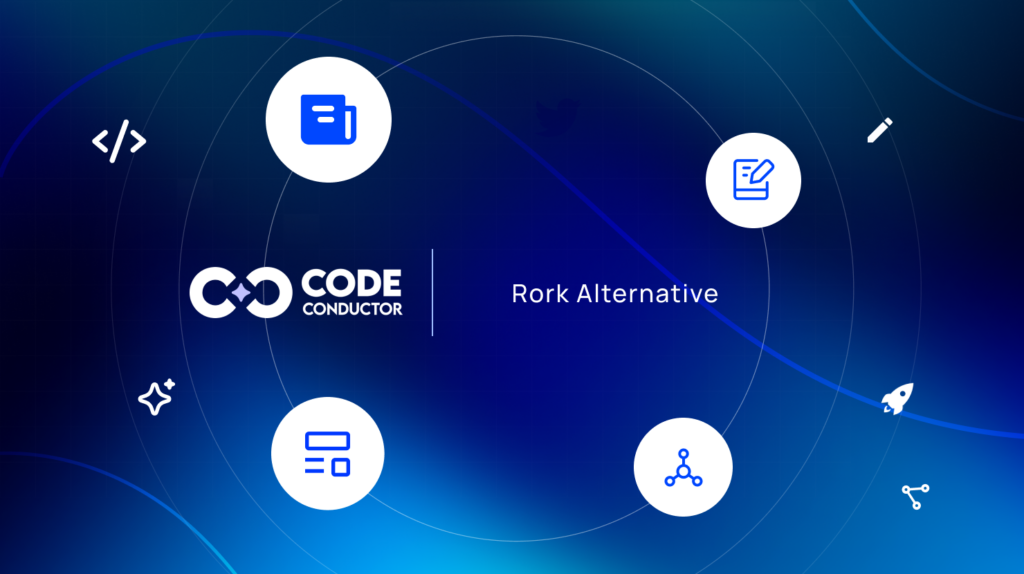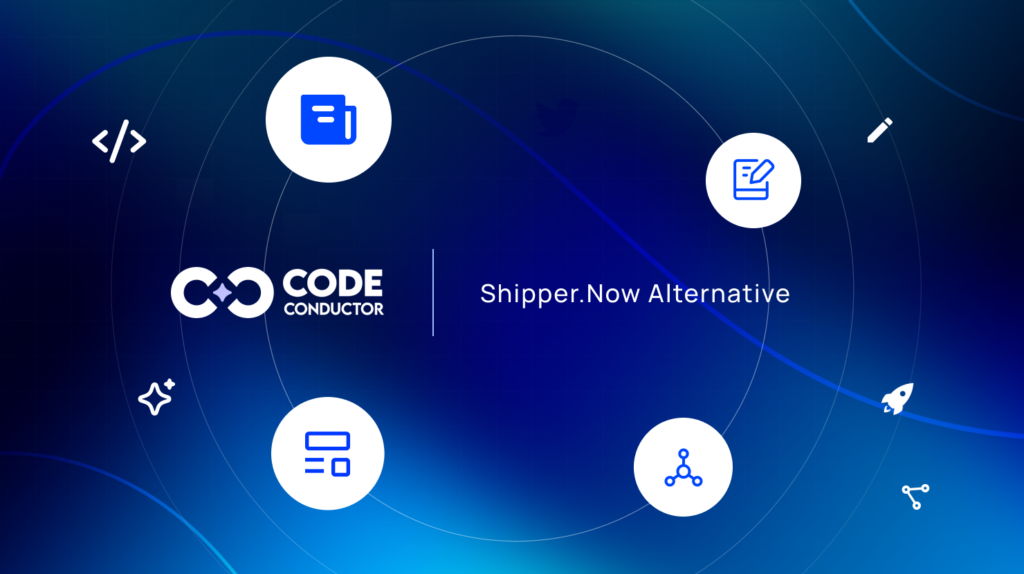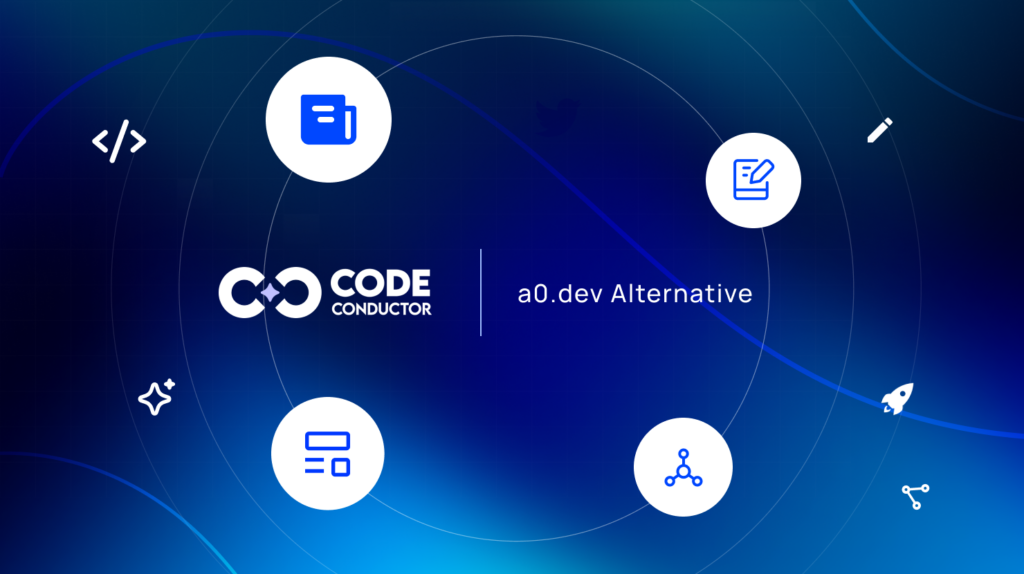10 years back building a website like Yelp was hard. It was a complex and resource-intensive task. It typically required the expertise of professional developers or the involvement of a digital agency, along with a substantial investment of both time and money.
Do you really think, it requires that much time, money, and resources in the present digital landscape that you needed a decade ago??? Definitely, the answer is NO.
- Because building a website like Yelp is possible in a day or just a few minutes. And all this happens with the evolution of AI website development platforms.
The AI website or software development industry has been rapidly evolving. Now, developing mobile applications and websites resembling popular platforms like Starbucks, Zillow, DoorDash, and travel apps has become surprisingly easy—all with just a few clicks.
If you’re looking to build a website similar to Yelp, CodeConductor is the only platform you’ll need.
In This Post
- What is Yelp & Its History
- Creating a Yelp-like Website: What Are the Essential Features to Include?
- Step-by-Step Guide to Building a Yelp Clone Website
- Monetization Strategies of Yelp-like Directory Websites Developed by Using AI
- What is the Cost of Developing Yelp Clone with AI-powered Software Development Platforms?
- Create your Yelp Clone with CodeConductor.AI
What is Yelp & Its History
Yelp, founded in 2004 by former PayPal employees Jeremy Stoppelman and Russel Simmons in San Francisco, quickly evolved from an email-based referral network to a comprehensive user-review website.
Its growth was fueled by a user-friendly interface, a robust review filtering system, and a revenue model centered on local business advertising. Over the years, Yelp expanded internationally, entering markets like Canada, Europe, and Australia and integrating features like reservations and delivery services, constantly adapting to user needs and technological changes.
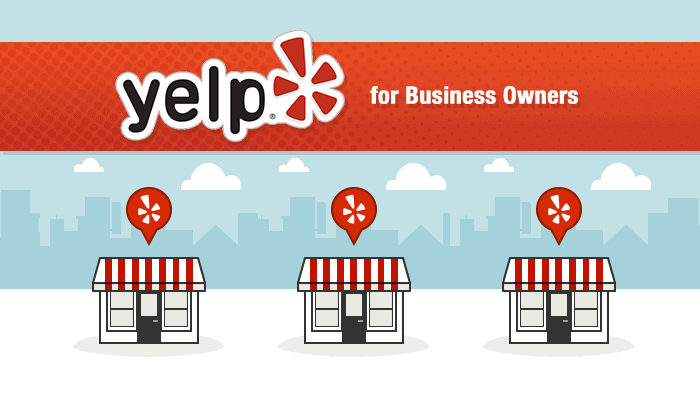
This history underscores the importance of understanding your audience and evolving with the market for anyone looking to create a similar platform. And the icing on the cake is that the individuals who want to create a Yelp-like website can develop the akin without any coding expertise. Yes, you read it right…..
Did you know that around 75% of new business is influenced by reviews on Google, Yelp, Google, Facebook, Yelp, Tripadvisor, Apple Maps, and Bing Maps. and other review websites? [source]
Creating a Yelp-like Website: What Are the Essential Features to Include?
Creating a website similar to Yelp involves incorporating several key features that are essential for its success. These features can be effectively implemented using AI solutions, which offer a user-friendly and cost-effective approach to website development.
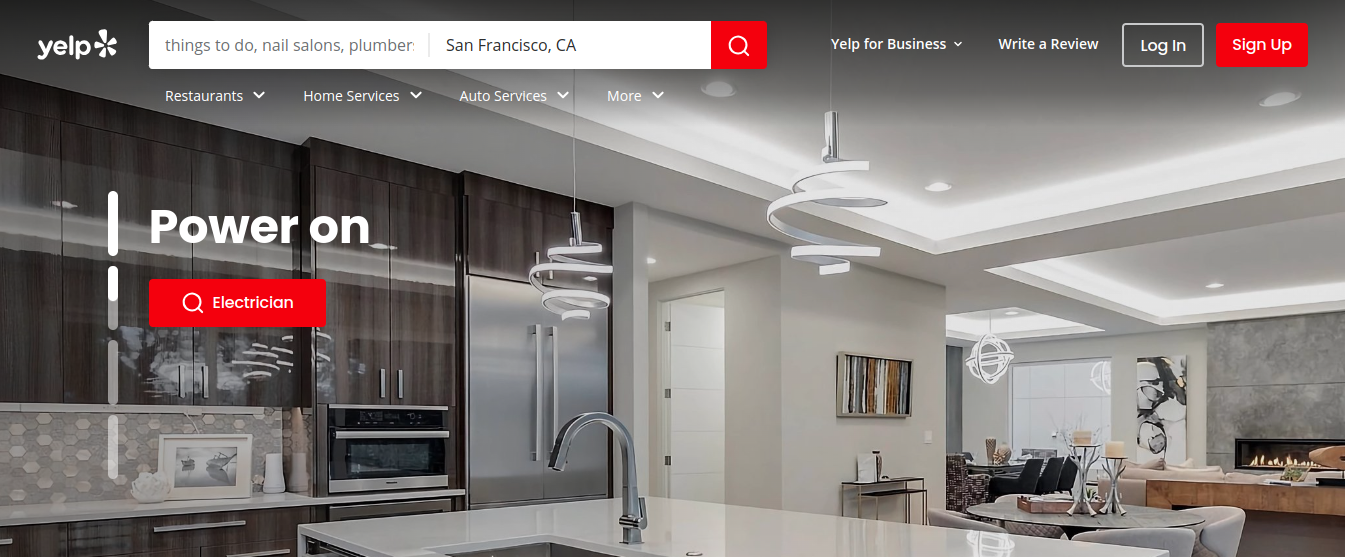
Here’s a breakdown of essential features and how they can be implemented using AI platforms:
- User Profile and Authentication:
The user profile and authentication feature is a cornerstone for any Yelp-like website. It ensures security, and integrity, and enhances user engagement through personalization. Implementing this feature using AI website development platforms simplifies the process.
These platforms generate production-ready code and provide pre-built, customizable modules for user authentication. it allows you to integrate secure login and registration systems into your website easily.
- User Reviews and Ratings:
The core of a Yelp-like website is its ability to allow users to post reviews and rate businesses. This feature helps other users make informed decisions based on community feedback.
Many website development platforms powered by Artificial intelligence offer customizable review and rating systems modules. These can be easily integrated into your website, allowing users to post reviews and rate services or products.
- Business Listings:
The next feature in the list is business listing. The Yelp clone that you will develop, allows user to create and manage their listings, providing details like location, hours of operation, and services offered.
There are multiple AI development platforms for websites that offer database functionalities. You can set up a structured database where businesses can input their information, which is displayed on the website.
- Search Functionality with Filters:
AI-powered website builders also create filters and sorting options, enhancing the user experience. As a result, users can search based on various criteria like location, type of service, and ratings.
- Map Integration:
This is the next important feature in the list as integrating maps helps users locate businesses and understand their geographical context.
Platforms like CodeConductor allow you to integrate maps into your website effortlessly. These maps can display business locations based on the data in your listings.
- User Profiles and Social Features:
User profiles where people can track their reviews, and preferences and interact with other community members are vital for engagement.
There are several AI software development platforms with pre-built templates for user profiles and social interactions, which can be customized to suit the needs of your Yelp-like website.
- Responsive Design:
Responsive design is a feature that can’t be skipped at any cost as more than 55% of traffic comes from mobile. It indicates that the website must be accessible and functional across various devices, including smartphones and tablets.
AI website development platforms like CodeConductor create responsive web platforms to ensure the design works well on all devices. So, no more hassle for designing.
- Analytics and Reporting:
Moving further, analytics are vital for businesses to understand customer feedback and for website owners to track user engagement and behavior.
Integration of AI-powered analytics tools can provide comprehensive insights without complex coding.
- Notifications and Alerts:
Several AI website development platforms often have built-in notification systems that can be set up to alert users based on specific triggers. As a result, users and businesses benefit from notifications about new reviews, messages, or updates.
You can build a Yelp-like website effortlessly by leveraging the power of advanced software development platforms powered by AI. This approach simplifies the development process and allows for greater flexibility and scalability as your website grows.
Step-by-Step Guide to Building a Yelp Clone Website
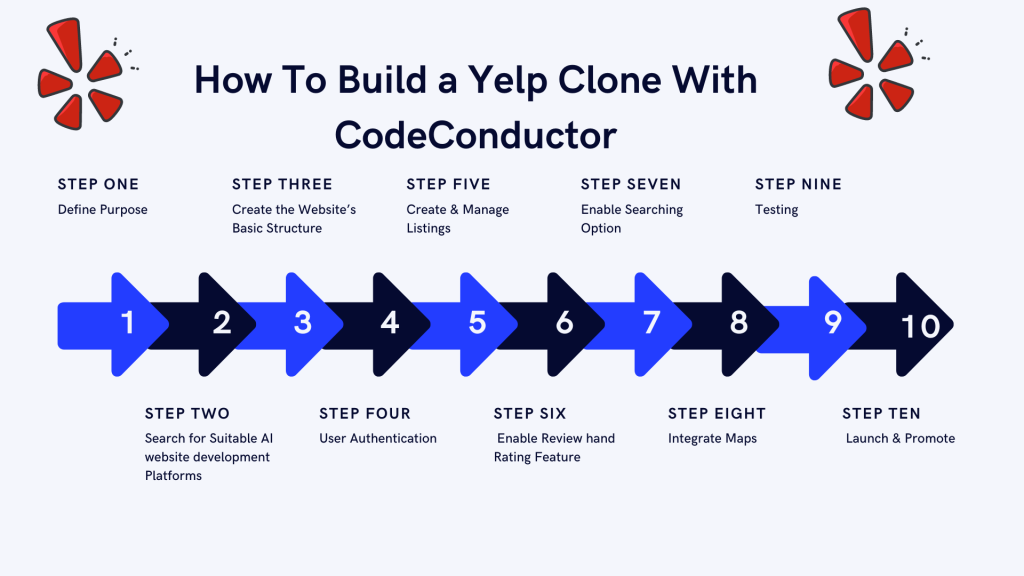
Building a Yelp clone website is a practical and achievable goal with today’s AI software development platforms. Here’s a sequential guide to help you through the entire development process:
- Step 1: Define Purpose
Start by defining the purpose and scope of your website. Determine the niche or focus, whether it caters to a particular business or service, and what unique features it will offer. Use mind-mapping software or simple brainstorming techniques to outline your ideas. - Step 2: Search for Suitable AI website development Platforms
The next step is to research and select an AI website development platform that suits your needs, considering factors like ease of use, customization options, and pricing. Explore the key factors for choosing the right development platform to select the appropriate option for the Yelp clone. - Step 3: Create the Website’s Basic Structure
Many AI website builders give you the basic structure of your Yelp clone including all the key features described in your requirements. You can customize that structure as per your specific needs, - Step 4: User Authentication
Going forward, implement a user authentication system and ensure users can create, edit, and manage their profiles. Utilize the built-in features of your chosen AI development platform to add sign-up, login, and user profile functionalities. - Step 5: Create & Manage Listings
Develop the system for businesses to create and manage their listings. Use the database features of the AI platforms to allow businesses to input and update their information, which will be displayed on their profile pages. - Step 6: Enable Review hand Rating Feature
The next step is to allow users to post reviews and rate businesses. Use forms and database functionalities with the help of functional experts who allow users to submit reviews and implement a rating system. - Step 7: Enable Searching Option
Implement a search bar with filters to help users easily find businesses. Customize search and filter widgets to sort listings based on various criteria like location, ratings, or service type. - Step 8: Integrate Maps
After implementing a searching option, the next thing is to embed maps to show business locations using map APIs embedded by the experts to display interactive maps. - Step 9: Testing
Conduct thorough testing of all features and functionalities. Perform user testing scenarios, check for bugs, and ensure the user experience is intuitive and error-free. - Step 10: Launch & Promote
Make your website live and start promoting it to attract users and businesses. Use social media, online marketing, and SEO strategies to increase visibility.
Traditionally, building a website is an iterative process. However, with the advancements in AI website development platforms, it becomes 5X faster to make improvements based on user feedback and changing market trends.
Monetization Strategies of Yelp-like Directory Websites Developed by Using AI
Monetizing an AI-powered Yelp-like website involves creatively integrating various revenue-generating features while maintaining a user-friendly experience. Here’s how you can do it:
- Advertising: Firstly, consider advertising. Allow businesses to purchase ad space on your site, such as banner ads or featured listings. It would be great to use your platform’s advertising modules or third-party tools for ad management.
- Premium Listings for Businesses: Next, there’s the concept of premium listings for businesses. Here, you offer a basic free listing, but for a fee, businesses can unlock enhanced features like better search result placement or richer profile content.
- Subscription Model for Users: Another revenue stream is a subscription model for users. While basic access remains free, users looking for a more tailored experience, such as personalized recommendations or an ad-free environment, can opt for a paid subscription.
- Commission on Bookings or Sales: Commission on bookings or sales is also a smart strategy, especially if your site facilitates transactions like restaurant reservations. Charging a small commission on each booking or sale can accumulate significant revenue over time.
- Sponsored Content: Sponsored content presents a unique opportunity. By partnering with businesses to create informative and engaging content, such as blog posts or videos, you can promote their services in a way that adds value to your users.
- Affiliate Marketing: Affiliate marketing is another strategy to consider. By partnering with other businesses, you can earn a commission for every referral or sale that comes through your website.
- Event Promotion: Event promotion can be a lucrative feature too. Charge businesses to promote their events, like workshops or local happenings, on your platform. This not only generates revenue but also enriches your site’s content.
- Data Insights and Analytics: Providing data insights and analytics to businesses for a fee is a great way to monetize the wealth of data your site will accumulate. Businesses are often willing to pay for detailed insights into customer behavior and trends.
- Custom Branding for Businesses: Lastly, offering custom branding options for business profiles can be a premium feature. Businesses looking to stand out can pay to customize their profiles with their branding, enhancing their visibility and identity on your platform.
Incorporating these monetization strategies requires a delicate balance. It’s important to ensure they enhance rather than detract from the user experience. By focusing on providing value and maintaining user engagement, your AI-powered Yelp-like website can become a profitable venture while serving as a valuable resource.
What is the Cost of Developing Yelp Clone with AI-powered Software Development Platforms?
Well, the cost of developing a Yelp-like website or mobile app with AI-powered website and mobile app builders may vary from $2500-$7500. However, some AI development platforms enable you to build yelp clones for free, but such platforms give you a basic structure without any ownership of source code and expert support.
Create your Yelp Clone with CodeConductor.AI
In conclusion, the landscape of AI website development platforms, especially for creating online directories like Yelp, is rapidly evolving. By providing production-ready code, these platforms are set to revolutionize how directory websites operate, making them more user-centric, efficient, and adaptable to changing market needs 5X faster.

For those looking to embark on this journey, CodeConductor.AI emerges as a promising platform in the AI website development arena. It is an AI-powered website & mobile app builder where you can create your own Yelp clone website & app faster than ever (usually, before finishing your cup of coffee ????).
CodeConductor, an AI powered software development platform is designed to empower entrepreneurs, small business owners, and enthusiasts to bring their ideas to life within just a few minutes.
By leveraging a platform like CodeConductor, you can:
- Effortlessly Set Up Your Directory: Utilize user-friendly interfaces to build your website without writing a single line of code.
- Customize to Fit Your Niche: Tailor your website to cater to specific industries or interests, setting your platform apart from competitors.
- Integrate Key Features: Incorporate essential elements such as user reviews, business listings, advanced search filters, and more.
- Scale as You Grow: CodeConductor’s scalable architecture means your website can grow with your business, accommodating more listings and traffic without compromising performance.
Creating a Yelp clone with CodeConductor.AI is not just about replicating an existing model; it’s an opportunity to innovate and carve out your unique space in the online directory market. So don’t wait and book your free demo now!

Founder CodeConductor

